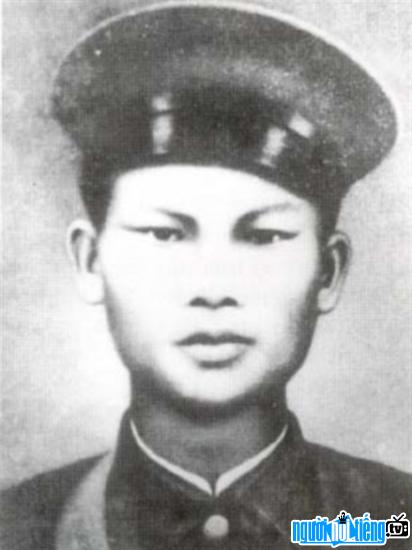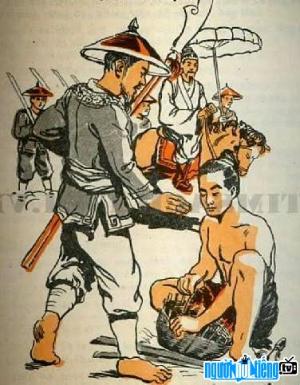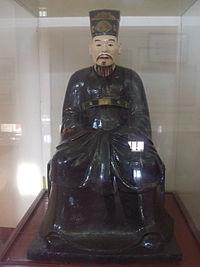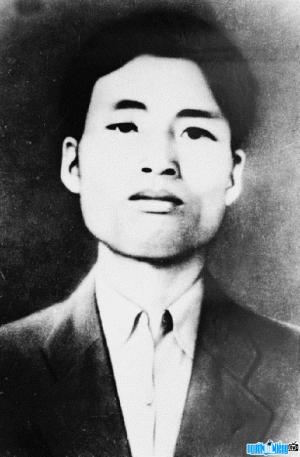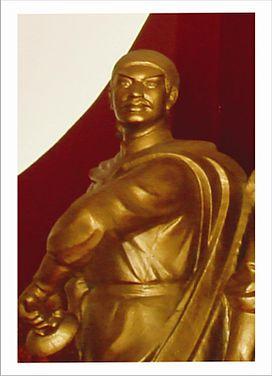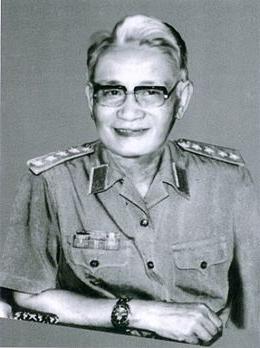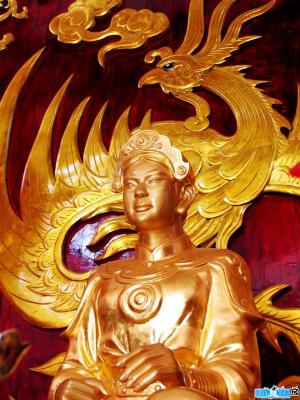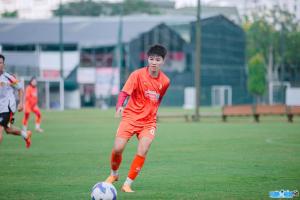Vietnam War Hero Phung Chi Kien
Phung Chi Kien
Living place: Bac Kan
Birthday: 18-5-1901
Global rank: #70219
Email: updating
Phone number: updating
Phung Chi Kien, whose real name is Nguyen Vi, also known as Nguyen Van Lieu, is a Vietnamese revolutionary and military man. He was the first general of the Vietnamese people's army.
In the period from 1925 to 1927, when the General Department of Vietnam Revolutionary Youth Dong Chi Hoi was in Guangzhou - China, he was sent to Nghe An. Static operation. In October 1926, he and some other members were introduced to Guangzhou to attend the first training class by Nguyen Ai Quoc organized, then attended Hoang Pho Military School.
In 1927, Chiang Kai-shek terrorized the communists so the school had to close door. He and a number of Vietnamese cadres joined the communist army, and at the same time participated in the Guangzhou uprising that took place on December 12, 1927 led by the Chinese Communist Party, he held the position of Captain of the Red Army. Chinese farmers. This riot failed, the revolutionary army withdrew to build the Soviet Zone in Luc Phong and Hai Phong districts.
In 1930, he joined the Communist Party of Vietnam. In February 1931, introduced by Nguyen Ai Quoc, Phung Chi Kien attended a class at the Oriental University of the Communist International. However, when he arrived in Manchuria, he was imprisoned by the Japanese fascists for nearly a year. After he was released, he changed his name to Can and then went on to the Soviet Union to continue his studies.
From 1933 to 1934, he studied at the Oriental University in Moscow. In 1934, Phung Chi Kien returned to Hong Kong and joined the Overseas Leadership Committee of the Communist Party Indochina with Ha Huy Tap, Le Hong Phong, to prepare for the 1st National Congress of the Communist Party of Indochina held in Ao Mon - China in 1935. During this congress, he was elected to the Standing Committee of the Central Committee in charge of party work abroad.
In 1936, he went to Saigon with Ha Huy Tap to direct the movement. revolution in Indochina according to the resolution of the Seventh Conference of the Communist International, and the resolution of July 16, 1936 of the Conference of the Central Committee of the Party, with the aim of demanding freedom, democracy, food and clothing. and peace for the people.
The following year, he went to Hong Kong to work, using an identity card named Phung Nguon Vinh, but was arrested and deported by the British police. In 1938, he joined the Overseas Leadership Committee of the Indochinese Communist Party and published the Dong Qing newspaper in Kunming - China. In early 1940, he and Nguyen Ai Quoc worked in Cong Minh. He has brought Nguyen Ai Quoc many times to many places such as Khai Vien, Mong Tu, Chi Thon, Nghi Luong... of Yunnan province - China. In June 1940, he and Nguyen Ai Quoc returned to Tinh Tay, a town in Guangxi province bordering China - Vietnam to prepare to return home when the time came.
On January 28, 1941, he and Nguyen Ai Quoc returned to Pac Bo, Cao Bang province, he organized a number of training courses and trained Viet Minh cadres for the province Cao Bang, Lang Son, Bac Kan, and some lowland provinces. In May 1941, he attended the 8th Central Conference organized by Nguyen Ai Quoc and was elected a member of the Central Committee.
At the end of June 1941, the French colonialists. mobilized about 4,000 troops, divided into three attacks to launch a siege and sweep the base areas to destroy the headquarters of the Viet Minh and the newly formed armed forces. The secret facilities of the Party Central Committee and the National Salvation Army were constantly under serious threat. During an emergency meeting in Khuoi Noi (in Vu Le commune), the National Salvation Army Command sent a security team to escort leading cadres of the Communist Party's Central Committee back safely.
He was assigned to be the commander of the National Salvation Army Bac Son fought and fought a number of major colonial battles. France. Because of the difference in forces and weapons, the leadership of the Bac Son - Vo Nhau base left one squad to block the enemy, and two other platoons went forward to break the siege to open a way to withdraw to Cao Bang to protect the enemy. full force. On August 19, 1941, the army of Phung Chi Kien and Luong Van Tri passed through Po Kep - Bac Kan, when they were ambushed by the enemy but fortunately escaped. On August 21 of the same year, the unit continued to be ambushed and surrounded in Bang Duc commune while on the way to Cao Bang. Luong Van Tri was injured and died. Although Phung Chi Kien was seriously injured, he still shot and blocked the enemy's troops so that his teammates could escape the encirclement. He was captured, and beheaded by the enemy on August 22, 1941. The French army planted his head at Ngan Son bridge to threaten the morale of local cadres and soldiers.
He was posthumously awarded the Third-class Victory Medal by the state. After more than 62 years of his death, he was appointed a general by the Vietnamese government and the Communist Party of Vietnam in November 2013. His name is given to roads in many provinces in the country such as Hanoi, Hue, Thai Nguyen, Hai Duong. .. in memory of his merits for the country.
Close relationship
Updating!
Height: updating
Weight: updating
Measurements: updating
Phung Chi Kien was born in 18-5-1901, death day is 22/08/1941, at the age of 40.
Where is Vietnam War Hero Phung Chi Kien's birth place, what is Zodiac/Chinese Zodiac?
Phung Chi Kien was born in Nghe An, of Vietnam. Mr working and living in Bac Kan, of Vietnam. Mr, whose Zodiac is Taurus, and who Chinese Zodiac is The Ox. Phung Chi Kien's global rank is 70219 and whose rank is 8 in list of famous Vietnam War Hero.
/
Top famous Vietnam War Hero
Top famous Zodiac of Taurus
Top famous Chinese Zodiac of The Ox
Top celebrities born in 1901
Top celebrities born in May
Top celebrities born in 18th
Born in Nghe An
Comment:
Cotent:
Events in 1901 and 18-5
Events in the world in the birth year of Phung Chi Kien
- Queen Victoria dies on Jan. 22 after a reign of nearly 64 years, and is succeeded by her son, Edward VII.
- The Boxer Rebellion officially ends on Sept. 7 with the signing of the Peace of Beijing.
Birthday Phung Chi Kien (18-5) in history
- Day 18-5 year 1642: The city of Montreal in Canada today was founded by the French.
- Day 18-5 year 1804: Napoleon Bonaparte was proclaimed Emperor of France by the French Senate.
- Day 18-5 year 1896: The Supreme Court affirmed racial segregation in Plessy v. Ferguson as "separate but equal."
- Day 18-5 year 1920: Pope John Paul II was born near Krakow, Poland.
- Day 18-5 year 1953: Jacqueline Cochran became the first woman to fly faster than the speed of sound.
- Day 18-5 year 1974: India became the 6th country to become a nuclear power.
- Day 18-5 year 1980: Mount St. Helens, in Washington state, erupted after being dormant for 123 years.
- Day 18-5 year 1994: Israeli troops withdrew from the Gaza strip after three decades of occupation and Palestinians took over.
- Day 18-5 year 2000: A bill was finally passed that removed the Confederate flag from the South Carolina statehouse.
- Day 18-5 year 2003: President Megawati Sukarnoputri of Indonesia declared martial law and sent 30,000 troops into Aceh.
- Day 18-5 year 2004: Sonia Gandhi stunned her party, the Indian National Congress, by refusing to accept the prime ministership of India.
